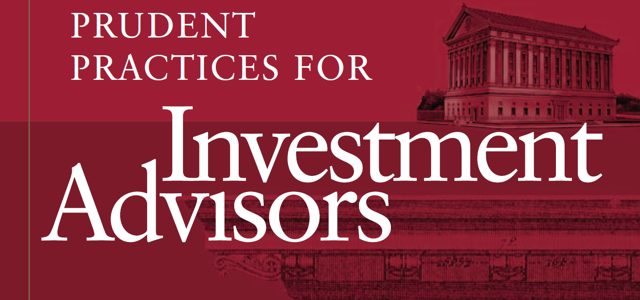 I just renewed my Accredited Investment Fiduciary® (AIF®) designation for another year after completing six hours of Continuing Education credits. The AIF® designation is put out by fi360.com. Currently three firm advisors have AIF® designations: David John Marotta, Bob Arms and Matthew Illian.
I just renewed my Accredited Investment Fiduciary® (AIF®) designation for another year after completing six hours of Continuing Education credits. The AIF® designation is put out by fi360.com. Currently three firm advisors have AIF® designations: David John Marotta, Bob Arms and Matthew Illian.
David John Marotta’s article Ten Questions to Ask a Financial Advisor was selected as a finalist in the 2012 fi360 article competition.
Fi360 promotes a culture of fiduciary responsibility and improves the decision making processes of investment fiduciaries and other financial service providers. Here is an explanation of their focus and the AIF® designation from their website:
Investment fiduciaries are constantly exposed to legal and practical scrutiny — it comes from multiple directions and for various reasons. It is likely that complaints and/or lawsuits alleging investment mismanagement will continue to increase. Although some of these allegations may be justified, many can be avoided by having clear knowledge of who constitutes a fiduciary and what is required of one.
The AIF training and designation help mitigate this liability by instructing in practices that cover pertinent legislation and best practices. The Accredited Investment Fiduciary® (AIF®) designation represents a thorough knowledge of and ability to apply the fiduciary Practices. Through fi360’s AIF Training programs, AIF designees learn the Practices and the legal and best practice framework they are built upon. AIF designees have a reputation in the industry for the ability to implement a prudent process into their own investment practices as well as being able to assist others in implementing proper policies and procedures.
For these reasons, the AIF was named one of the “Ten Most Wanted” designations in the investment industry by Financial Planning magazine.
And here is the code of ethics AIF® designees are requires to attest to:
fi360 AIF® Code of Ethics
To my clients, I will:
- Employ and provide the client information on the Prudent Practices when serving as an investment fiduciary and/or advising other investment fiduciaries.
- Act with honesty and integrity and avoid conflicts of interest, real or perceived.
- Ensure the timely and understandable disclosure of relevant information that is accurate, complete, and objective.
- Be responsible when determining the value of my services and my form of compensation; taking into consideration the time, skill, experience, and special circumstances involved in providing my services.
- Know the limits of my expertise, and refer my clients to colleagues and/or other professionals in connection with issues beyond my knowledge and skills.
- Respect the confidentiality of information acquired in the course of my work, and not disclose such information to others, except when authorized or otherwise legally obligated to do so. I will not use confidential information acquired in the course of my work for my personal advantage.
- Not exploit any relationship or responsibility that has been entrusted to me.
To my community (whether defined by work, family, and/or friends), I will:
- Proactively promote and be a steward of ethical behavior as a responsible partner among my peers in the work environment and in my community.
- Ensure that the overall promotion of my practice is implemented in the best interests of my profession.
- Seek, accept, and offer honest criticism of technical work; acknowledge and correct errors; and properly credit the contributions of others.
- Use corporate assets and resources employed or entrusted to me in a responsible manner.
- Continue to improve my knowledge and skills, share ideas and information with colleagues, and assist them.
We believe that you deserve a fiduciary standard of care.
Subscribe to Marotta On Money and receive free access to the presentation: Ten Questions to Ask a Financial Advisor.
One Response
tk
Nice article but it still does not tell you what a AIF does? What practice would use this?